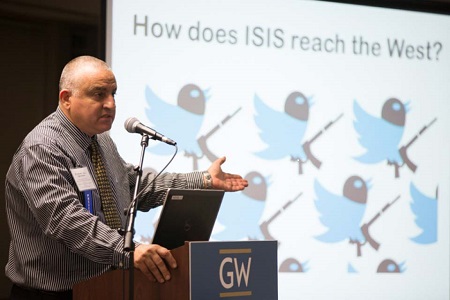Despite cold rain on the evening of November 9, about 100 cyber security, military and international affairs professionals joined Dean Ali Eskandarian and other GW faculty and staff for the opening of the GW Cyber Academy at the Virginia Science and Technology Campus in Ashburn. Three security experts explained how ISIS (The Islamic State in Iraq and Syria) has taken old propaganda tactics and combined them with new technology to become a threat in cyberspace.
The GW Cyber Academy is an initiative of CPS; its mission is to provide state-of-the-art degrees, certified training, and applied research that address the nation's workforce needs in cybersecurity and will also act as a community of professionals through speaker series and webinars.
Gabi Siboni, senior research fellow and the director of two programs at Tel Aviv University's Institute for National Security Studies demonstrated how ISIS's sophisticated propaganda operation uses the internet as any Western marketing or PR campaign would. Norman Hayes, a retired rear admiral in the U.S. Navy, said ISIS has used its resources to create an effective media machine to advance its local and global objectives, using social media to recruit fighters from across the globe. ISIS's ability to communicate and recruit worldwide is a source of power, said Yaacov Ayish, a major general in the Israel Defense Forces and armed forces attaché to the United States and Canada.
The speakers offered some ideas about how to counter ISIS in cyberspace. Cutting the group off from the Web would be difficult given that it isn't bound by geography. Removing content would be costly (though Dr. Siboni believed a Western coalition would eventually have more ability to delete content than ISIS would have to find new avenues to publish). Surveilling Western consumers of ISIS media and intervening before they travel to Syria or Iraq to join the extremist group is also possible as some recently publicized cases have shown.
This event was co-sponsored by the Institute for National Security Studies and the Cyber Security Forum Initiative.


